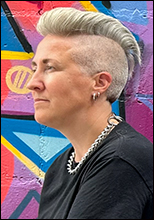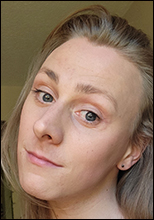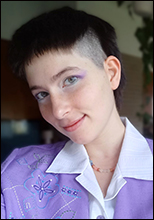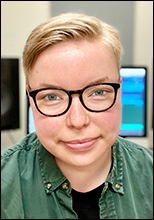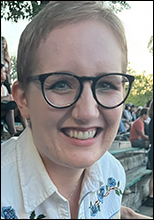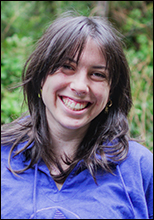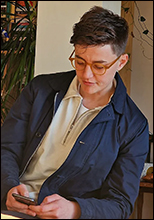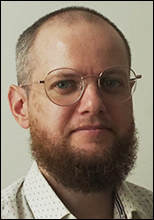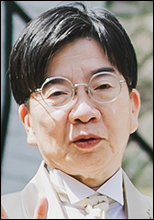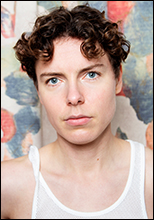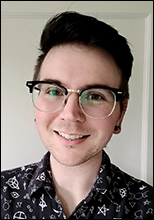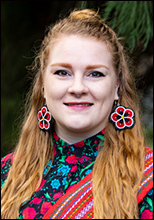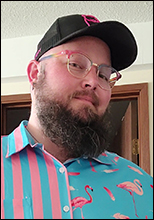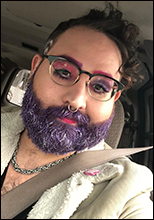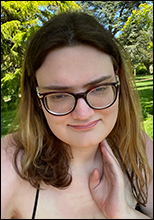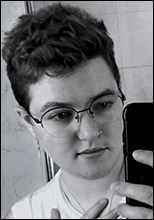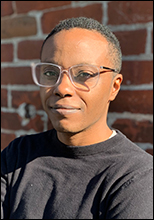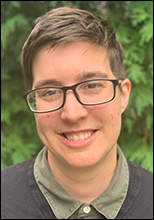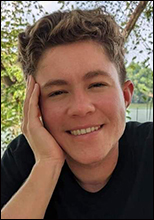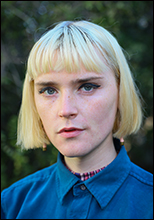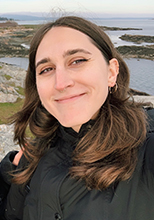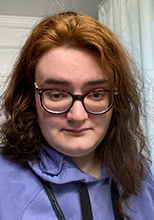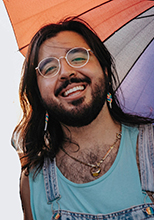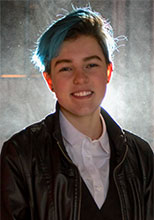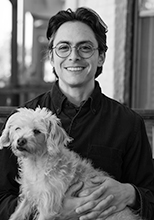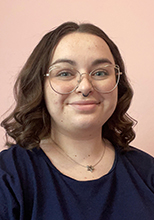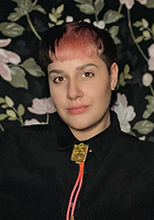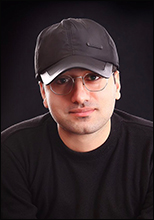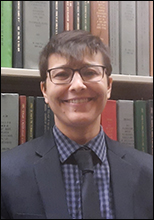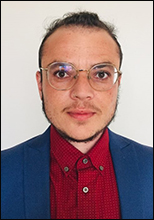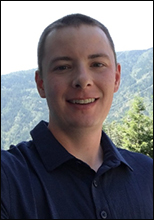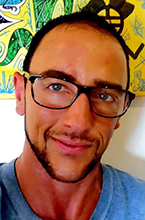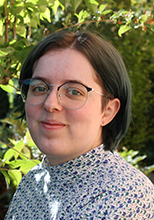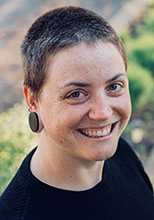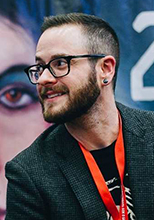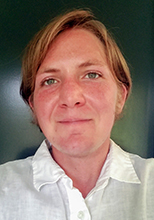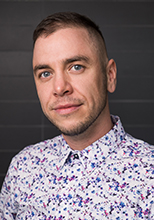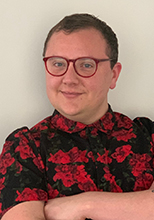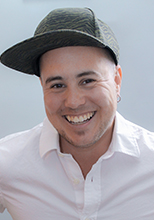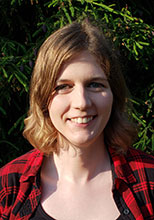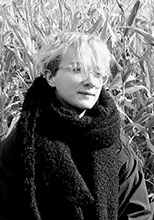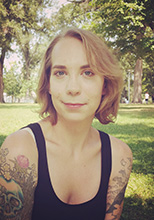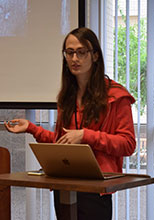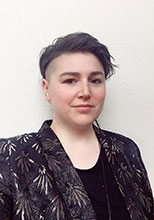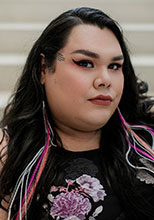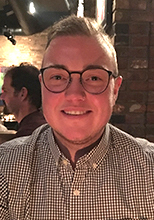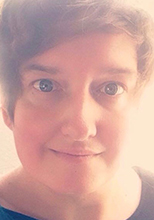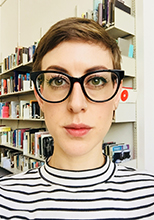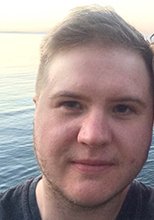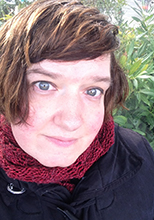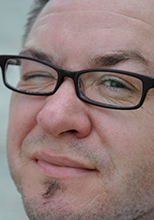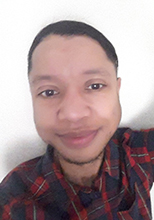Scholarship & fellowship recipients
2024
2024 Doctoral Degree Scholars
Şansal Güngör Gümüşpala
Receiving this scholarship from the Chair in Transgender Studies is profoundly meaningful to me. This scholarship provides essential financial support, enabling me to focus more intently on my research and community-building activities. Additionally, it motivates and validates my dedication to researching the intersection of youth, queer and immigration studies. With the support of this scholarship, I am excited to continue my academic and civic engagement efforts, contributing to my advocacy for trans+ rights both in Canada and Türkiye.
Nancy Henderson
I am very grateful for the support from the Chair in Transgender Studies. Receiving this research award allows me to work closely with the communities most impacted by the drug toxicity crisis and co-create outputs that are meaningful and useful to them.
2024 Master's Degree Scholars
Joy Cooper
I am deeply honoured to have been chosen for this scholarship from the Chair in Transgender Studies. In addition to being a wonderful financial boon, it is also a powerful personal affirmation. While completing my undergraduate degree, queer representation in upper mathematics would have meant the world to me. It is my sincere hope that while I pursue my research, I am able to make a difference in the lives of other queer students in math and stats.
Elif Cansu Gümüşpala
Moving to Canada two years ago to pursue my Master's in Sociology has been quite a tough journey, especially with the financial challenges in today's economy. I'm so grateful for the support from the Chair in Transgender Studies; it makes me feel truly supported, both financially and as part of the community..
Megan Harton
* Colonially known as Toronto, is located on the Treaty Lands and Territory of the Mississaugas of the Credit and the traditional territory of the Anishinaabe, the Wendat, and the Haudenosaunee.
** Victoria, BC is on the unceded territory of the Lkwungen (Lekwungen) peoples, and the Songhees, Esquimalt, and W̱SÁNEĆ First Nations.
Receiving this scholarship from the Chair in Transgender Studies is incredibly meaningful to me. It not only provides vital financial support for my research but also serves as a significant recognition of the importance of addressing discrimination and transphobia in the music technology industry.
Cloud Prewett
Receiving an award from the Chair in Transgender Studies is meaningful to me as an aspiring transgender academic. It is reassuring and inspiring to know that the achievements and inroads made by previous generations of transgender activists and scholars are still rippling the academic pool, and to feel those ripples myself in whatever way I can. Thank you for your consideration and generosity.
Camryn Riccitelli
I am extremely appreciative to receive a scholarship from the Chair in Transgender Studies. I value the support from the Chair, not only as a researcher but as a gender non conforming person and this scholarship will allow me to more fully devote myself to my research.
2024 Visiting University-based Fellows
Chris Aino Pihlak
I am honoured to receive this Visiting Fellowship to the Chair in Transgender Studies. It is important both that trans historians create trans histories, and those of us in the trans community know about those who came before us. This Fellowship will help me make visible some of the warts and wonders of 20th-century trans existence.
Chloe Turner
Turner’s PhD thesis connects anti-transgender rhetoric to studies of disinformation and an information environment characterised by moral panics about manipulation and coercion, the propagation of falsehoods and the production, organisation, detection, and perception of contagious and deceptive communication.
I am thrilled to be selected as a Visiting Fellow by the Chair of Transgender Studies. As the only research Chair of its kind and largest trans+ archive in the world, this is an unmatched opportunity to study how trans histories of survival and invention can inform strategies to protect transgender futures now, in the face of escalating global threats and dissemination of anti-trans disinformation.
Christopher Wolff
The Transgender Archives hold a rich variety of newsletters, as well as the papers of the Erickson Educational Foundation. Studying these publications and materials will strongly inform my thesis and is an invaluable opportunity for me as an emerging scholar. I’m very grateful to receive support from the Chair to visit the Archives.
2024 Community-based Fellows
Hama
As a senior transman who has been involved in LGBTQ activism in Japan for over twenty years, I’m interested in learning more about trans seniors in other countries. I am currently working on projects related to trauma experienced by queer and trans individuals in Japan from a social work perspective, and this is research I am undertaking with my partner, Dr. Kimiko Nagasawa from Kochi Prefectural University. I hope to connect with senior transmen through the University of Victoria, and to meet with them and hear about their experiences as I share my own as a transman in Japan.
Luka Holmegaard
As an artist and novelist writing from a trans perspective, I am immensely grateful for the opportunities granted with this fellowship to think and talk with, listen to, and learn from practitioners working with trans life and experiences. Along with being a huge recognition of my work, the Community Scholar Fellowship will make several vital steps of my current artistic process as a novelist possible; I will be able to research DIY trans healthcare in an expansive archive, learn from experts on the topic, and exchange on questions of trans representation with scholars and artists.
2023
2023 Doctoral Degree Scholars
Wyatt Maddox
I am thrilled to receive this award towards the completion of my research. Many trans folks are not provided the support or opportunities necessary to reach graduate level research. I aim to be a role model for the community as a trans academic in sciences.
Lydia Toorenburgh
It is very impactful to receive this award. I was not expecting to apply to grad school until next year. However, this summer I went to a two-spirit Metis gathering and through those conversations, created a research project concept. 10 days before the deadline to apply, my MA supervisor encouraged me to apply to start my PhD this September and with the excitement of my project and the strong connections with my two-spirit Metis community, I applied. However, this meant that I had already missed the deadline for the SSHRC. This means that I will have to find funding to support me and my partner until next funding round. This award is helping me to pursue an innovative and needed research project, so this award is an investment in the research product. This award also affirms my belonging in the community. I have been very involved in 2SLGBTQIA+ community and education/activism for years, but I had never felt confident bringing it into my research. This is my first step toward that, and having this award affirms the validity of my research and encourages me to feel confident continuing to be my full self in my scholarship. Kinanaskomitin.
2023 Master's Degree Scholars
Marshall Kilduff
It is such an honour to receive this scholarship from the trans chair to support my community-based research project. As a queer, trans guy studying 2SLGBTQ+ homelessness in Victoria, I feared I would struggle to find financial support for this work. It means so much that the trans chair has acknowledged the importance and timeliness of this project. Thank you!
Remy Quiroga
It goes beyond words how to describe being able to receive a scholarship from the Chair in Transgender Studies. As a disabled queer person who comes from a low socioeconomic background, being able to receive this award means the difference in having the ability to access time, care, and supports for my academic journey that means success in my research while navigating my own health in light of disability.
Abigail Romano
Receiving this scholarship is extremely important to me. Not only does it allow me to continue my studies by providing funds for my life and my research, but also it demonstrates that other people besides myself care about my research, and that gives me the motivation to continue my studies.
Eli Verdugo
I am extraordinarily grateful for the Chair in Transgender Studies. I have felt supported and uplifted since I got here by the Chair and the other trans+ researchers. This support in particular will be of tremendous help for my own study, which seeks to promote trans+ youths' mental health in La Paz, Mexico. Thank you so much.
Frances
I have long been a genderqueer student in the university context. So too, I have long received institutional support for my research. Never, however, have I received funding as a genderqueer student. Beyond merely assisting my individual needs, a scholarship like this signals that, whether or not we specialize in research on gender, the perspectives of my community are valued at UVic.
2023 Undergraduate Students
Roz Queen
"I am extremely pleased and honoured to get this award. It is a validation of a lot of hard work and it means I can afford groceries this month!"
Alexander Wolffe
As a student who experiences frequent barriers regarding funding, I am very grateful to receive this scholarship. We need more queer and trans people as the authorities on our own histories, especially in academia. The monetary support of the Chair and encouragement of the Archives is incredibly valuable to me as I move forward with my research.
2023 Visiting University-based Fellows
Cameron Awkward-Rich
I am honored and grateful to have been awarded this fellowship, which I will use to further my work on an edited volume of Red Jordan Arobateau’s journals by visiting the Transgender Archive’s newly acquired Red Jordan Arobateau collection. Arobateau’s entire body of life-writing is enormous, so any attempt to produce an edited volume requires significant thought, reflection, and care. The resources provided by the Chair in Transgender Studies will allow me to take the necessary time with these remaining traces of Arobateau’s life, to try to do him justice.
Cam Cannon
I am honored and excited to have received the Chair in Transgender Studies Research Fellowship. The Transgender Archives are a vital and prolific resource for understanding the ways in which trans people have resisted oppression and fought to form community throughout history, and I am eager to utilize some of the archives for my own project.
Emi Donald
Recieving this scholarship is deeply meaningful for both my dissertation research and my personal and professional deveopment. This scholarship allows me to spend crucial time with the collections at the Transgender Archives, and also gives me a very special opportunity to connect with peers and mentors in the field of transgender studies.
2023 Community-based Fellows
Muffy Koster
This is a vital moment, as our communities respond to those who seek to erase or make more palatable trans life and existence. It is an honor and a pleasure to instead insist on our complexity, to seek out and share our history in all of its glamor. I’m so grateful and excited to join the Chair in Transgender Studies and its archive in the work of boldly highlighting our lineages on our own terms and in our own words.
2022
2022 Doctoral Degree Scholars
Jamey Jesperson
Without a Doctoral Degree Scholarship from the Chair in Transgender Studies, I would not have been able to start my PhD at UVic last year and continue my research this year upcoming! As an international student who is vastly under-funded, I am beyond grateful to have found a scholarly community where my research is understood, valued, and financially supported through the Chair. There is a dire need for scholarship by trans feminine historians working at the intersections of trans history and colonialism, and I am ecstatic to be granted the resources necessary to make waves in my field!
Chanathip Suwannanon
As a middle-class Kathoey (or transwoman) from Thailand who received the great opportunity to access education in Canada, receiving this award from the chair in Transgender studies is very meaningful to me. Honestly, the first year of my PhD was uneasy and challenging in several ways. This grant will help me to have a well-balanced living, a time for thinking and focusing on my study in the upcoming school year. I thank the Transgender Studies Chair for providing this opportunity. What I hope to contribute in the future is to establish Kathoey studies and found a Kathoey/Trans archives in Thailand to weave our stories together and create a space where we can belong to each other.
2022 Master's Degree Scholars
Cameron Chevrier
I’m very thankful for this support from the Chair of Transgender Studies. This award allows me to bring visibility to a topic that I am passionate about and validates the importance of such research. Thank you!
Elif Cansu Gümüşpala
As a person who is a nonbinary queer and lives in Turkey, receiving a scholarship from the Chair in Transgender Studies has many meanings for me. In addition to getting financial support, which was very crucial for me because of the current economic crisis in Turkey, it gives me energy and encourages me to keep my studies on the subjects that I want despite the oppressive and exclusive attitude of my country. Receiving this scholarship has already made me feel safe in the inclusive environment of the school. I am excited to start my work on Uvic. Thank you so much for your support!
Şansal Güngör Gümüşpala
I have felt the support of The Chair in Transgender Studies since I came to Victoria. I am proud to be a part of this community, and it is a great honor to be chosen as a recipient of this scholarship. This scholarship will support my efforts and help make the voices of nonbinary individuals in my country heard. I am thankful to the Chair for their support.
Abigail Romano
I am overjoyed and greatly thankful for receiving this scholarship, which should help aid me in conducting the best research that I can while I am a student at University of Victoria. I am excited to excise my inner demons about how sexology has destroyed the psyche of our people and demonstrate its malaise on trans-feminine self perception.
Eli Verdugo
This scholarship means a lot to me. It is a significant support to my research project and me, which in turn will allow me to benefit my community through my work. As a non-binary researcher, this scholarship is also a reminder of the importance of supporting one another as a community, and that trans* voices in research deserve to be amplified.
2022 Undergraduate Students
Alexander Connolly
I am honoured and so grateful to receive this scholarship. University has only been made accessible to me through funding such as this. The support of both the Chair and the Archives, whose work is very near and dear to my heart, means the world in encouraging me forward with my research. Centering queer and trans scholars on queer and trans topics is of great importance to me and these opportunities are steps forward towards that!
Anonymous
My research is grounded in exploring care, collaboration, and embodiment as queer and decolonial praxes in the arts. As a non-binary cultural practitioner and fourth year fine arts student, I feel honoured and deeply grateful to receive this scholarship from the Chair in Transgender Studies to support me in continuing my studies and community work.
2022 Visiting University-based Fellows
Ariel Goldberg
I am honored and grateful for the resources to be able to travel and immerse myself in such an abundant collection of trans life and resistance.
Hannah K. Grabowski
The Chair of Transgender Studies and the collections at UVic sparked the idea for my upcoming dissertation, so to be welcomed to campus through their visiting scholar fellowship is beyond meaningful to me. Beyond the significance of having the chance to engage with amazing periodicals and ephemera, I am excited to meet and build relationships with the scholars residing at UVic and with the other fellows. I already foresee this opportunity to be a life-changing one and I am extremely grateful.
Kaci Switzer
2022 Community-based Fellows
Dade Lemanski
In addition to providing me with meaningful material support to continue my research and writing, which itself is a rare opportunity for scholars and artists outside the academy, this scholarship offers recognition, context, and a cohort. The recognition that the scholarship offers helps to remind me that what I'm working on doesn't just matter to me but is meaningful and important to trans people and our history, and gives me the opportunity to locate myself in that history, among other artists and scholars (with credit to Jules Gill-Peterson, I'd count all trans people in that number, we who create and document our own ways of living, our own bodies) who care about what we have said, and what we still have to say.
2021
2021 Doctoral Degree Scholar
Jamey Jesperson
Jamey is an incoming Ph.D. student in History with a concentration in Cultural, Social, and Political Thought. Her dissertation, “Trans Elimination in the British Empire: The Case of British Columbia (1795-1871),” seeks to contribute to historiographical debate on the impact of British settler colonialism on “two-spirit” Indigenous traditions across Turtle Island, specifically the Pacific Northwest. Jamey comes to UVic with a M.A. in Queer History from Goldsmiths College, a B.A. in Global Studies from The New School, and several years of experience in education, advocacy, and decolonial activism. As a white settler, Jamey is passionate about approaching trans histories under settler colonialism through a lens of accountability towards contemporary decolonization and queer Indigenous resurgence.
Without a Doctoral Degree Scholarship from the Chair in Transgender Studies, I would not have been able to start my PhD at UVic this year! Having faced funding barriers for the past few years, I am beyond grateful and relieved to be joining a scholarly community where my research will be understood, valued, and challenged. There is a dire need for scholarship by trans feminine historians, and I am ecstatic to have this opportunity to further my education and start making waves in my field!
Sajjad Kaveh Shaldehi
Sajjad Kaveh Shaldehi has just been accepted as a PhD student in the Department of Sociology at UVic. Before coming to Victoria, he completed his bachelor's and master's degrees in Sociology at the universities of Guilan and Allameh Tabataba'I, Iran. His area of interest is social minorities, marginalized groups, resistance movements, subcultural youth, underground communities, and avant-garde lifestyles in Muslim majority societies in the Middle East. He is particularly interested in assessing the role of minorities in democratic processes and cultural pluralism in Muslim societies in the Middle East.
For his doctoral research project, Sajjad Kaveh Shaldehi intends to explore the lives of transgender youth in Iran from a political perspective. In particular, he will focus on the new generation of Iranian transgender persons who have entered the civil struggle -from civil disobedience to resistance movements- against the mainstream conservative culture. In this regard, the aim of his research project is to discover the lived political experiences of transgender youth in the Islamic environment of Iran.
As a newcomer and self-fund student to Victoria, it takes me a while to get to know the Victoria’s environment and find a job. Therefore, the $ 5,000 award of Chairs in Transgender Studies will cover part of my living expenses and give me the opportunity to focus more on my studies. In addition, winning this scholarship motivates me to pursue my studies with more energy and enthusiasm; because for me, this means that there are still "those" who are interested to hear on minorities’ activism (especially transgender persons) to achieve their democratic and equal rights in Muslim societies. I sincerely thank Professor Aaron H. Devor, Distinguished Professor of Sociology and Chair in Transgender Studies at UVic, for supervising my doctoral project and Transgender Studies’ group for providing this scholarship.
2021 Master's Degree Scholars
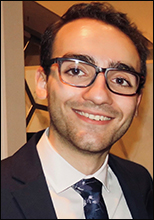
Anthony Amato
As a cisgender gay man, this scholarship will continue to assist me in conducting research supporting sexual and gender minorities alike. Similarly, it will highlight social disparities and protective factors experienced by cisgender and transgender gbMSM as a direct or indirect result of COVID-19.
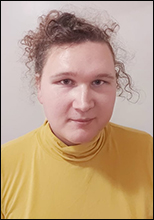
Chris Pihlak
I find myself doubly indebted to the Chair in Transgender Studies! Their support early in my academic career is a vote of confidence that is deeply appreciated. In addition, my very work is made possible by their archives. I would not be here were it not for trans friendship, trans community, and trans-led organizations like the Chair in Transgender Studies. I view this not as an award but as a further indemnity to my community. It is my hope that, in some small way, my work gives back to the community that I owe and love so much.
Anonymous
Receiving this scholarship and announcing details about me publicly is an incredibly significant process in my journey. It gives my true self, agency, validation, and joy.
2021 Undergraduate Research Scholar
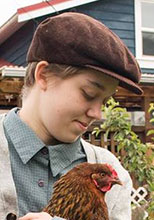
Sage Dunn-Krahn
Sage Dunn-Krahn (he/they) is a medieval studies student, illustrator, and comics creator. Their project studies medical texts and sensational fiction about trans-masculine-like people from Early Modern France, specifically the way these texts develop a structure to freeze gender transgressors in a single gender ‘truth’. This research will reflect on current discourse about ‘real’ and ‘fake’ transgender people, and reveal the complex history of the idea of the ‘true’ transgender.
Receiving the Chair in Transgender Studies Undergraduate Scholarship means an incredible amount to me. I have a huge amount of respect and admiration for the work that the Chair in Transgender Studies does for trans people like myself, whether through the Transgender Archives at UVic, the lecture series, or activism. This scholarship validates my interests and lived experience, and I hope encourages others in the same direction.
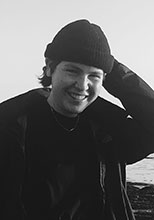
Mira Harvey
Mira Harvey is a fourth year History and Greek & Roman Studies major, with research interests in gender, sexuality, and Indigenous history of the Prairies and Northwest. They have written about the interpretation of gender on the Columbia Plateau, as well as household archeology in Bronze Age and medieval Greece. This year, they are undertaking a JCURA research project identifying different types of hearths at the site of ancient Eleon. In future, they plan to complete graduate studies in library science and archives, with a focus on decolonizing the archive and its associated institutions.
Receiving the Chair in Transgender Studies Undergraduate Scholarship means an incredible amount to me. I have a huge amount of respect and admiration for the work that the Chair in Transgender Studies does for trans people like myself, whether through the Transgender Archives at UVic, the lecture series, or activism. This scholarship validates my interests and lived experience, and I hope encourages others in the same direction.
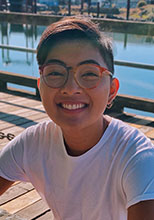
Q Roxas
Q Roxas (they/them) is a queer, trans non-binary, Filipinx settler of Ibanag, Ilokano, and Tagalog descent. They are currently majoring in Political Science and minoring in Gender Studies. This upcoming year, they will be writing their Honours thesis under the supervision of Dr. Kelly Aguirre. Q plans to use an autoethnographic approach, and will offer gender variance and fluidity as a critique to race politics. They will explore topics at the crux of gender and sexuality, diasporic identity, gendered colonial violence, settlerhood, and generative future-building.
I'm so grateful to receive this award which will fund a project that is very close to my heart following a year of financial instability due to the current pandemic. This award is a humbling and kind reassurance for me that my work as a trans non-binary person of colour is supported by other members of the campus community.
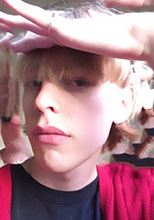
Jasper van Alderwegen
I am a fourth-year honours student nearing the end of my Bachelor of Fine Arts in the Visual Arts program. Outside of school, I am working on a solo exhibition for Xchanges Gallery in downtown Victoria, on unceded Lək̓ ʷəŋən and WSÁNEĆ Territory. The exhibition will explore the fluidity of being in the world, using folkloric language based on European myth and folklore. This will be expressed through collaged painting and sculpture.
I am sincerely honoured to receive this award! I have infinite gratitude for the work that the Chair in Transgender Studies provides. By centring trans, non-binary and two-spirit researchers directly, you amplify the work that we do. For me, I am able to take more time in the studio as well as engage more deeply with our community. Thank you!
2021 Visiting University-based Fellows
Elvis Bakaitis
Mr. Elvis Bakaitis currently serves as the Interim Head of Reference at The Graduate Center Library, City University of New York. They are liaison to the Women’s & Gender Studies Department, University LGBTQ Council, and Board Member of CLAGS: The Center for LGBTQ Studies.
At UVIC, Bakaitis will conduct research for the project Spiritual & Esoteric Formations in Queer Print Culture(s). Their research focuses on grassroots print culture(s): zines, LGBTQ posters/graphics, queer/feminist bookstores. They look forward to developing these themes within the context of queer and transgender publications held at UVIC, including the extensive papers of Reed Erickson.
There’s profound meaning in being able to visit UVIC through this Fellowship. The connection to LGBTQ lives, past and present - as well as a collectively imagined future - is palpable and real in the context of an archive, enlivened by photographs, newspaper clippings, ephemera. A sense of shared history often emerges, and one that is so often denied to queer people. The Chair of Transgender Studies Fellowship offers an excellent opportunity to explore myriad themes - gender diversity and spirituality, community networks, and more. I’m looking very much forward to sharing the research and discoveries with wider communities through scholarship, zines, and comics.
Slava Greenberg
Slava Greenberg is a postdoctoral fellow at the University of Southern California School of Cinematic Arts and Casden Institute. His research explores the potential of mainstream and emerging media forms to offer transformative experiences in reference to disability studies, trans studies, and gender. He is the author of Animation and Disability: Cripping Spectatorship (Indiana UP 2022) and co-editor of Fireflies: Journal of Film and Television II. His articles have appeared in Review of Disability Studies, Animation, TSQ, Jewish Film and New Media, Frames Cinema Journal, and forthcoming in The Moving Image, and Journal of Feminist Studies in Religion. He is currently working on a second book project focusing on the history and visual culture of gender dysphoria centering on Reed Erickson..
This fellowship is tremendously significant in jumpstarting my second book project focusing on the history and visual culture of gender dysphoria through the lens of trans and crip theories. On a more personal note, visiting the largest trans archives in the world and home to the most comprehensive Reed Erickson collection is not only crucial to this new study, but it has also been a long-time dream of mine.
Ellis Kokko
Ellis Kokko (they/them) is a non-binary activist and a PhD candidate in Anthropology at Edinburgh University. They are working on an ethnographic history of the ‘suffering transgender subject’, examining how shifting ontologies of suffering have held a central role in making trans lives and selves intelligible. In particular, they are interested in emerging narratives of trans trauma and mental health, and the kind of subjects, affects and futures that are made in/visible in the process. Set in the context of the anti-transgender backlash in the UK, the research centres around questions of victimhood, identity and the intangibility of trans futures. Alongside their PhD, they run a queer hiking project, and are working towards becoming a counsellor.
I was thrilled when I received the news of the fellowship! Being a working-class, trans anthropologist is at times lonely and I look forward to imagining alternative trans futures together with other trans, queer and two-spirit scholars. As my ethnographic project centres on changing ontologies of trans suffering, the Transgender Archives will provide a unique perspective on these questions.
2021 Community-based Fellows
Linden Jennings
My project involves creating a resource for family doctors and urologists to improve their abilities to care for their trans patients who have undergone gender-affirming lower surgery (metoidioplasty or phalloplasty), with the goal of providing care locally rather than requiring them to travel to see the surgeons based in Vancouver, BC.
Receiving a Chair in Transgender Studies Research Fellowship for Community-based Scholars award will allow me to create a much-needed resource for these providers as an educational tool for metoidioplasty and phalloplasty, improving their knowledge of the subject with the goal of this translating into improved patient care and outcomes post-operatively.
Shaan Knan
As a queer heritage practitioner, this is an exciting opportunity for me to learn from North American communities, including two spirit, hoping that I can further contribute to moving trans history forward.
2020
2020 Doctoral Degree Scholar
Bailey McGuire
I am a transgender non-binary PhD student in the Biochemistry and Microbiology department. I study heat adaptation in the simple model organism Escherichia coli (E. coli), with possible climate change applications such as developing an organism better suited to biofuel production than natural E. coli and improving artificial selection techniques for evolving thermotolerance in crucial higher organisms such as corals. Alongside my research and coursework, I work with the Chair and other members of my department to promote inclusivity and to improve awareness of and provide education around social issues.
It means a lot to me to have my gender recognized and accepted by members of the university. Receiving this scholarship from the Chair in Transgender Studies helps support my research and professional development as a non-binary researcher. I am very grateful for receiving this award, thank you so much!
Mattie Walker
My doctoral research explores how trans, nonbinary, and Two Spirit people experience and navigate the concept of safety and embodied experiences of safety within the context of trauma support work (therapy, counselling, outreach, mental health support). This work aims to inform mental health providers’ practice knowledge in order to improve supports for trans, nonbinary, and Two Spirit people who have experienced trauma. As a PhD student in the Social Dimensions of Health program and a practicing clinical counsellor, I see my research as an extension of social justice work by being able to produce research that will inform practice, policy, and mental health initiatives.
I am deeply honoured to receive this award. Throughout my academic work, the Chair in Transgender Studies has been a continual support and invaluable resource. This is a powerful award to receive as it validates that the research I am doing is important and meaningful for trans, nonbinary, and Two Spirit scholarship and community.
2020 Master's Degree Scholars
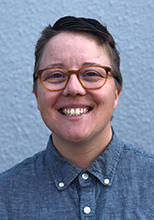
August Armstrong
This project is an intimate dive into the relationship that formed between a found photo album, that lay discarded at a thrift store, and myself. The moments that remained on the pages spanned the years of 1917-1919 in the Pacific Northwest. The academic research that stems from this is the fruition of a deepening awareness of the layered erasures that have evolved and enshrined the colonial, heteropatriarchy, capitalist ethos that permeates the collective visions/versions of what was, is, and will be. The work intends to interweave the (re)imagining of archive, affect, and critical place through queer imagination and vision. In so doing, engaging discourse towards the broadening of children, youth, and families queer ancestral consciousness alongside the larger LGBTQIA+ collective.
This scholarship is an affirmation of being in alignment with the academic and collective visions of this research. This honouring that has been awarded is a balm in a time of weary wounding that continues to be uncovered and reopened through necessary reflexive practices that aim towards my own queer liberation. To have received this award fills me with deep gratitude for those that have made these academic platforms possible.
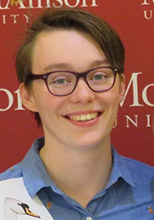
Ellis Evans
I am honored to receive this award. To me, it represents that trans people belong in the scientific community. I am proud to be a trans scientist, sharing what I know with others.
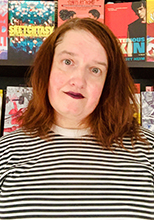
Audrey Wolfe
As a queer trans non-binary woman entering her final year of grad studies during a pandemic, I am so grateful to receive a scholarship from the Chair of Transgender Studies. It means the world to me for have the support of the Chair of Transgender Studies as I explore the ways that LGBTQ youth made sense of their experiences with child sexual abuse and dating violence while also making sense of their own identities. This scholarship has allowed me to spend the summer buried in novels and poems instead of trying to worry about paying my tuition after losing my employment due to COVID-19.
2020 Undergraduate Research Scholar
Anonymous
The Chair in Transgender Studies research scholarship has given me the opportunity to properly support my partners as we lay the foundation for our Needs Assessment and our funding applications. This scholarship has given me the breathing room to be able to focus on my studies and the key components of the project without worrying about the initial financial outlay. I am a firm believer in Community Based Participatory Research and am very glad that my fellow queer community members will be supported as we get our project off the ground. Thank you for helping me, and us, take the next step!
2020 Visiting University-based Fellows
Cáel Keegan
Cáel M. Keegan is Associate Professor of Women, Gender, and Sexuality Studies at Grand Valley State University and Special Editor of Arts and Culture for Transgender Studies Quarterly. He is the author of the book Lana and Lilly Wachowski: Sensing Transgender and has published essays in Genders, Queer Studies in Media and Popular Culture, Transgender Studies Quarterly, Mediekultur, Spectator, Journal of Homosexuality and FLOW. His current book project explores the development of a postwar transgender cultural imaginary that was taken up by and subsequently altered the forms of North American mass media over the second half of the 20th century.
I am thrilled to be selected as a visiting fellow by the Transgender Archives: Access to our histories is crucial for transgender studies and transgender people alike.
Jay Pahre
Jay Pahre is a queer and trans settler artist, writer, and cultural worker currently based on the unceded territories of the of Musqueam, Squamish and Tsleil-Waututh peoples. Weaving between drawing, sculpture and writing, his work queries trans and queer nonhuman ecologies at points of intersection with the human. Pulling from lived experience, shifting geographies, and queer/trans ecologies, his work seeks to ferret out alternative formations and futures of what queer and trans ecologies might look like while slipping through moments of temporal and ecological precarity.
I am honored to receive this fellowship as it will be an amazing opportunity to continue this project along community-driven nodes of connection, process, and thought. Access to the Transgender Archives for this project will provide a chance to sit with the creative works and writings of Trans, Two-Spirit, and Queer artists and writers who have been working with and through trans ecologies.
Annie Sansonetti
Annie Sansonetti is a PhD candidate in Performance Studies at New York University’s Tisch School of the Arts. Her dissertation, “Arts and Performances of Transgender Girlhood,” posits care practices and instructions for trans girls in the intergenerational work of trans woman artists from 1900 to present.
To receive a scholarship at the University of Victoria’s Transgender Archives is a dream come true. What a rare space: a public archive devoted not to the murder and erasure of trans women and girls, but their aliveness and survival instead. I’m really looking forward to spending time with the collections of such women and girls, with fellow transfeminine lovers, sisters, and friends from other times and places—Aiyyana Maracle and her granddaughters and the ladies of Fantasia Fair to name a few. Oh, and who could forget the adorable and impish pocket-sized copies of Transvestia’s earliest editions? I can’t wait to hold them in the palms of my little trans girl hands!
Tobias Wiggins
Tobias B. D. Wiggins is an assistant professor of Women’s and Gender Studies at Athabasca University. His research centers transgender mental health, queer visual culture, clinical transphobia, accessible community-based wellness, and psychoanalysis. During his fellowship, Wiggins will be pursuing archival research for “The Trans Sexualities Digital Storytelling Project.” This project aims to redress the significant dearth in knowledge surrounding the history of transgender people’s sexuality by investigating the records, documents, art, and rare publications that contain traces of trans sexual narrativization across generations. The groundwork built by this archival research will inform data collection with trans participants through cutting-edge art-based participatory storytelling research in collaboration with Re•Vision: The Centre for Art and Social Justice at the University of Guelph. Learn more at tobywiggins.com
The practice of archiving marginalized public cultures is a necessary act of rescripting, and for the Transgender Archives, of reshaping the historicization of gendered difference. An archives documents without interpretation or the force of normative authority. Value is established though collectively recognized ephemera and memories that sit in wait. My visit to the Transgender Archives is meaningful insofar as I have been given an opportunity to admire and showcase that which had been rendered inconsequential by ciscentrism. To be a transgender scholar, ruffling through artifacts of my predecessors, I am gifted with the ability to bring my experience to meet theirs, to generate new meanings, and to envisage non-linear temporalities of queer and trans testimony.
2020 Community-based Fellows
Wesley Flash
It is an honor to be awarded a Community Scholar Fellowship which supports my practice as an artist. I feel guided by transcestor Reed Erickson to be in the presence of his work and I am very excited to connect with him and all the others who I hope to encounter in the archives.
Rémy Huberdeau
Rémy is researching trans history in the Canadian Prairies to inform character development for a fiction script writing project, as well historical language and social framing of top surgery for a new short film.
I’m excited to visit the Trans Archives and am grateful that such a resource exists by and for our diverse trans, nonbinary and Two-Spirit gendercommunities.
2019
2019 Master's Degree Scholars
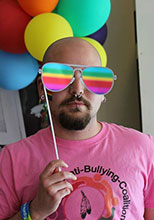
Vincent Bolt
I have lived in Sudbury Ontario my entire life, and work with trans people in various communities across North Eastern Ontario. I have a Bachelor of Arts degree in English Literature, and a Bachelor of Indigenous Social Work from Laurentian University. I am starting my Master of Social Work at University of Victoria this fall. Thank you for selecting me for this scholarship. This means a lot to me.
Alyx MacAdams
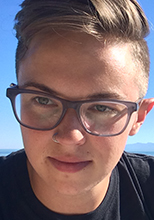
Receiving this award is meaningful not only because it makes a statement that research centring Trans, Non-Binary, and Two-Spirit people is necessary and of value, but because it encourages graduate students like myself to see our research with trans communities and our place within academia as important.
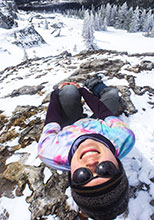
Gabe Schepens
Thank you very much for this award, I'm pleased to accept it!
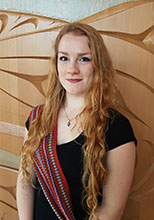
Lydia Toorenburgh
Tansi, my name is Lydia. I am an Otipemisiwak (Cree-Métis person) with settler and Dutch immigrant ancestry. I have long known that I am bisexual, but have more recently begun the journey of coming into a Two-Spirit identity with the guidance of my elders. In my Masters of Anthropology research, I will be working with two powerful women scholars as we look into the challenges of marginalized individuals in accessing healthcare. To do this critical, community-engaged research, we will be using audio-visual research methods in order to amplify and prioritize the voices of the community.
Tansi, my name is Lydia. I am an Otipemisiwak (Cree-Métis person) and first-generation Dutch immigrant. I begin my graduate studies at UVic in September and I am so grateful to be doing so with the support of the Chair in Transgender Studies Master’s Degree Research Scholarships For Trans, Non-Binary, and Two-Spirit Students. Becoming one’s self is a long journey; I constantly struggle with navigating the intersections of my own race, sexuality, and gender but as I have stepped onto the path of earning and learning my Two-Spirit identity, I am finally experiencing the coming-together of my many different selves. Not only has this award helped to ease the stress of funding my education, it has given me a sense of acceptance an acknowledgement by the gender-queer community. I am looking forward to becoming a person that our community can be proud of.
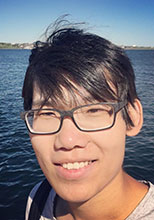
(Alivia) Tianyi Wang
My research focuses on designing highly coloured and fluorescent molecules from existing dyes. Those dyes have long known to the research community, and my aim is to broaden their applications by simple chemical modifications. My research extends to all fields of chemistry, using experimental and computational methods to widen our understanding. While answering fundamental questions about their chemistry, my research project is to also enhance the optical and electronic properties of those dyes, allowing future applications in the fields of biology, medicine, and materials.
It is a great honour for me to receive this scholarship. As someone who started to transition very recently, receiving this scholarship reassures my confidence in my own decisions. With increasing awareness of minorities of all sorts in the STEM fields, this scholarship also inspired me to advocate for them, increasing their visibility. With full heart, I thank the Chair, all the staff, and the donors that make this scholarship possible.
2019 Doctoral Degree Scholar
Elanna Stephenson
I’m a PhD student in the department of Chemistry. I completed my BSc in Chemistry at the University of Alberta and am originally from Edmonton. My research is in microfluidics, the study of fluids on the micrometer scale. My project uses microfluidics to form artificial lipid bilayers similar to those found in cells. I am able to apply these bilayers to the study of how drugs interact with and are absorbed across cellular membranes. My aim is to develop new microfluidic tools for studying how drugs are absorbed throughout the body, improving safety and reducing costs of the drug development pipeline.
I am grateful for the support of the Chair in Transgender Studies and am honoured to receive this award. Having the support of the Chair in Transgender Studies available to trans, non-binary and two-spirit students across all fields is a privilege. Thank you for helping me to achieve my education and career goals.
Kara Taylor
I am a queer, non-binary femme, academic/musician with two fierce, social justice warrior kids. My research sits at the intersection of sociology, social and public health/policy, medicine and medical education, and health systems research in the field of Transgender Health. Specifically, my dissertation research examines the barriers involved in the provision of, and access to, Trans, Two-Spirit, and Non-binary (T2SNB) competent primary health care, as well as the creative ways in which physicians and patients navigate those barriers. I hold a BA and MA in Sociology from the University of Victoria, Social Justice stream. I have been awarded both the Frederick Banting and Charles Best Canada Graduate Scholarship from the Canadian Institute of Health Research and a Doctoral Fellowship from the Social Science and Humanities Research Council of Canada. I have been published in Social Science and Medicine, as well as Feminist online publications. I am also a singer-songwriter who plays old country, and I am passionate about community-building and collective care.
This award is very important to me, as I thought I would have to leave my program (with a partial dissertation written!) due to chronic illness. This funding will help to subsidize a semester off of my employment at the Canadian Institute of Substance Use Research, where I have been working on a community-based project about queer men who engage in chemsex using meth, so that I can finish writing.
2019 Visiting University-based Fellows
Terrence Abrahams
Terrence Abrahams is a MA candidate in the Literatures of Modernity program at Ryerson University. A University of Toronto alumnus and poet, Terrence is currently in the process of completing his major research paper. His research focuses on exploring, examining, and learning more about the distinct forms of poetry and poetics utilized by transgender writers across North America, with a particular interest in writers based in Canada. His aim is to contribute to the ongoing and necessary work of ensuring the creative efforts and contributions of trans writers is allowed space in academic study.
Receiving this scholarship from the Chair of Transgender Studies at UVic will be a great help as I continue what I know will be a research effort I carry on with throughout my academic career and beyond. I am looking forward to utilizing The Transgender Archives in order to broaden my understanding and knowledge of the creative contributions of transgender writers from the past and present, with a look toward the inevitable future of trans writers. I believe the poetry and poetics of trans people make up some of the most exciting and incomparable works being published today, and I want my research to highlight and celebrate their essential efforts.
Gwen Benaway
Gwen Benaway is a trans girl of Anishinaabe and Métis descent. She has published three collections of poetry. She was a finalist for the Dayne Ogilvie Prize for LGBTQ writers from the Writer’s Trust of Canada, the Lambda Literary Award for Trans Poetry, and the Ontario Trillium Book Award for Poetry. She is a Ph.D student at the University of Toronto in the Women and Gender Studies Institute, focusing on transsexual embodiment and liberation. Her work with the Transgender Archive will be a collaborative project with Arielle Twist and Trish Salah.
Receiving the Fellowship is a tremendous opportunity which will support me in my ongoing work towards trans liberation.
Sophie Pezzutto
Sophie Pezzutto is a PhD candidate in Anthropology at the Australian National University. Prior to commencing her PhD, Sophie worked as an accountant and holds degrees in Economics and Asian Studies from the University of Western Australia. Sophie's research is the first ethnographic study of the transgender pornography industry conducted in anthropology. As part of her research, she spent 13 months living in Los Angeles and Las Vegas, participating in trans porn performer's lives. She is particularly interested in how fame and social media shape performers' understandings of self, friendship, privacy, and embodiment and what this can tell us about our lives under 21st century neoliberal digital capitalism.
One of my project’s main challenges has been the transient nature of online pornography which makes it difficult to trace a history of erotic representation of trans people. Receiving this fellowship allows me to spend significant time at the Transgender Archives, looking specifically at the archive’s collection on pre-internet newsprint and glossy pornographic magazines, which will hopefully help provide the project with historical context on the erotic representations of trans people. Additionally, I am also just really excited to meet other trans advocates and scholars and learn about how they are affecting positive change in academia and beyond. The interdisciplinary nature of transgender studies can offer anthropology students such as myself valuable insights from other sciences especially when many anthropological accounts of gender and sexuality have been inadequate in representing trans experiences of embodiment and intimacy. Specifically, I look forward to exchanging ideas with scholars in gender, science and technology, and media studies.
MT Vallarta
MT Vallarta is a poet and Ph.D. candidate in Ethnic Studies at the University of California, Riverside, studying contemporary queer Filipina/o/x poetry and its role in conducting transformative resistance and futuristic desire that challenge the (hetero)normative regime of U.S. capitalism and colonialism in the Philippines and the Filipina/o/x diaspora. A Kundiman Fellow, MT’s poetry has been published in Nat. Brut, Rabbit Catastrophe Review, Apogee Journal, TAYO Literary Magazine, and others. They are extremely honored to receive this fellowship, and look forward to conducting research at the Chair in Transgender Studies Archive and being a part of UVic’s community of scholars.
As a queer, non-binary, Filipinx/American, I am extremely honored to receive a Visiting Scholar Fellowship to conduct research at the Chair in Transgender Studies Archive. I look forward to contributing to the field of Transgender* Studies, and thank the queer, trans, non-binary, and two-spirited scholars, artists, activists, and workers who made this possible.
2019 Community-based Fellows
Estraven Lupino-Smith
Estraven’s research at the archives will be rooted in a trans ecology framework that asks: In what ways can we think critically about how hetero/cis normativities have shaped and produced perspectives of the so-called natural world? This work will problematize conceptions of nature, and re-envision trans and other non-normative bodies and experiences as part of complex ecologies that are only beginning to be discussed in mainstream science and social science research. This work will counter the way trans bodies have been deemed bestial, monstrous, and undesirable, taking up a critical perspective on the shape-shifting and liminal bodies of trans people as more-than-human. This research will discuss and highlight the history of how trans bodies and trans cultures interrupt set ideas about biological essentialism, and can re-shape the way that ecology, ecosystems, and “the natural order” are perceived and perpetuated.
I am honoured to be granted a Fellowship from the Chair in Transgender Studies, which will allow me to pursue my research-creation project on trans ecologies. I am excited to immerse myself in the rich histories of resistance and resilience in the Archives. This fellowship is an ideal way for me to continue work affiliated with the academic world while sharing my project with a broader audience as a Community Based Scholar.
Arielle Twist
She is an author and multidisciplinary artist. Within her short career, she has attended a residency at Banff Centre for the Arts and Creativity, has work published with Them, Canadian Art, The Fiddlehead, PRISM International, This Magazine, and CBC Art and has been Nominated for a Pushcart Prize and Shortlisted in The National Magazine Awards, both in 2019. ‘Disintegrate/Dissociate’ is her first collection of poetry.
Her poetry, multi-media pieces, and performances have being exhibited in art galleries countrywide including The Khyber Centre for the Arts in Halifax, Toronto Media Arts Centre in Toronto, la galerie centrale powerhouse in Montreal, Centre for Art Tapes in Halifax, The Art Gallery of Mississauga in Mississauga, Art Gallery of Nova Scotia in Halifax and The Agnes Etherington Art Gallery in Kingston.
Its an incredible opportunity to receive a scholarship from the Chair in Transgender Studies at University of Victoria. I am honoured to go through the work of our aunties; the matriarchs who came before us and write, create and work from their histories.
2018
2018 Master's Degree Scholars

Alexie Glover
My research uncovers and historicizes an overlooked aspect of America’s transgender history. The heterosexual male cross-dressers, or transvestites, of mid-century America constituted a group of individuals that espoused a particular discourse of respectability in their cross-gender practices, conceptualized unique bi-gender identities, advanced medical understandings of cross-gender individuals, and cultivated a community. My work uses the archives of Virginia Prince, Ariadne Kane, and Fantasia Fair to demonstrate the important political and theoretical advances made by a community that has largely been ignored by historians of the transgender phenomenon in the United States. My research prompts transgender historians to think critically about the diversity of identity categories that are encompassed in our present understanding of the term ‘transgender’.
The support of the Chair in Transgender Studies simply makes my research possible. The Chair’s commitment to trans-related research has forever altered the academic environment at the University of Victoria. Without the expertise, financial backing, and investment in the collection and preservation of the material housed in the Transgender Archives, this project would simply cease to exist. With the support of the Chair, I have met my scholarly idols, presented my research at conferences across the country, and been provided with an entirely unique graduate student experience. “Thank you” is simply not enough. My gratitude is endless.
Nathan Strayed
Nathan is currently a Masters of Social Work student at University of Victoria where he is looking closely into hospital care of trans patients specifically, in psychiatric services. Nathan comes to this program with years of experience working as a support worker in Vancouver’s Downtown Eastside and more recently working in hospital with youth diagnosed with mental health concerns. Nathan has also worked as research assistant at Stigma and Resilence Among Vulnerable Youth at the University of British Columbia looking into trans folks experiences accessing gender affirming surgery and healthcare. In addition to this education Nathan has been a long time advocate for the trans community. During his time at Simon Fraser University, Nathan organized a successful “shit in” on campus to advocate for gender inclusive washrooms and for trans students to have the ability to use their “preferred” name on class lists and degrees.
I'm happy to receive this scholarship from the Chair in Transgender Studies firstly, because a department like this exists. Secondly, because this department is directly contributing to supporting trans folks in an academic setting who will in turn support trans folks in community. My project is related to supporting trans folks in psychiatric care and this scholarship is the recognition that the mental health of trans folks is important. In short, this scholarship means that I can spend my semester focussed on trans folks in psychiatric care rather than thinking of how I will support myself. I am so grateful to the department for this support and recognition, thank you.
Elanna Stephenson
My research is in the field of microfluidics, often referred to as “lab-on-a-chip”. It is an interdisciplinary branch of science concerned with the manipulation of fluids on the micrometer scale. A microfluidic chip contains channels the size of a human hair, allowing experiments as small as a few nanolitres in size. My work sits at the crossroads of chemistry, biology and engineering. It focuses on using droplets on these chips to mimic the bilayers found in human cells, which will allow us to gain insight into how drugs are absorbed by and removed from the body.
I'm honored to receive this award and am grateful for the support of the Chair in Transgender Studies. It is a privilege to be at an institution that places a high priority on the academic success of trans students and I am grateful that the Chair in Transgender Studies can provide this support to trans students across all fields.
Audrey Wolfe
My research explores how LGBTQ and gender-fluid youth make sense of their experiences with sexualized and intimate partner violence. My inquiry is situated within the West Coast of Canada and the United States during the 1990s when feminist theories about violence and public discourses about queerness were shifting. This (auto)ethnographic research will include analyzing zines and pieces of personal narrative text to access distinct aspects of survival that do not yet exist within the current literature upheld by the academic world.
Receiving this award means the world to me! As a student who relocated for graduate studies and has experienced barriers to employment, I have struggled with paying the high costs of tuition. Without this award, I would not be able to complete my final semester of coursework and begin my journey through autoethnography.
2018 Doctoral Degree Scholar
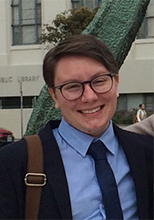
Leo Rutherford
My primary research interest is transgender men's sexual health after having surgery related to their genitals; such as metoidioplasty or phalloplasty. There is a significant lack of literature on sexual health after these surgeries yet sexual health is important for quality of life and overall health. Proposed methodology for my dissertation includes the use of a community based participatory framework in which trans men who have had or want to have surgery will design a survey which will be distributed across Canada and the U.S. Results will be shared widely in the community and with doctors or surgeons who can benefit from better understanding this population’s unique sexual health needs.
Being awarded a Chair In Transgender Studies Scholarship has provided an amazing opportunity to share my work with the academic and trans communities. Having support for the work I am doing is an invaluable asset to my studies and future career. So few trans people have access to this kind of support;
I plan to use this privilege as I work with community to improve our health and well-being.
2018 Visiting University-based Fellows
Lauren Fried
As I reach the end of my PhD, which is based between the Victoria and Albert Museum and the Royal College of Art, I am excited to take forward part of my doctoral research to produce a publication about trans community histories in the UK.
Receiving this award means I am able to progress with a publication based on my doctoral research about UK-based trans histories using the essential archival holdings at TGA. Sources of funding for the study of LGBTQ+ histories is relatively scarce in the UK, so the TGA’s Research Fellowships for Visiting University-based Scholars and Professionals is a rare and exciting opportunity. I look forward to adding to the ongoing and dynamic conversations about trans histories, and to have support enabling my contribution to this field.
Jonah Garde
Jonah Garde is an activist, community organizer, educator and PhD student in Gender Studies at the University of Bern. In Vienna, they are the co-organizer of the monthly film event trans*screenings X SPACE which aims to feature trans* representations that are marginalized within mainstream media. Their PhD thesis deals with trans* temporalities exploring the entanglements between trans* narratives, medico-legal discourses, history of science, the pharma-industrial complex as well as trans* activisms and cultural productions. They have studied Development Studies at the University of Vienna and their work on Cripping Development has been published by Peter Lang and in the Journal Somatechnics.
Unlike in any other field, time as normative structure is highly visible in classical trans* narratives imagining gender transition as a linear and progressive path from one gender into "the" other. Medico-legal productions of trans* subjectivity rely heavily on notion of stability as well as progress. These narratives are simultaneously called for by gatekeepers and strategically reproduced by trans* people seeking access to medical care or legal recognition. In these cases, time functions as normalizing order and is not the mere effect of power relations, but rather fundamental for their becoming. Time is simultaneously a signifier defining the relation between self and Other and a site of biopolitical in- and exclusions. Based on the critique of colonial narratives of progress, heteronormative and ableist conceptions of time my research project follows multiple sites to trace the colonial, gendered, racialized, ableist, and nationalist underpinnings of trans(chrono)normativity as well as to analyse the ambivalences of temporal normalizations and resistances to conceptualize an intersectional approach to trans* time.
As a Gender and Cultural Studies PhD student the Visiting Fellowship allows me to further my research on trans temporalities and I am immensely grateful for the opportunity to work in the extraordinary archive. As trans* identified scholar, community member and organiser I am especially interested in the history and the structure of the archive itself, as it is my dream to set up a trans*inter* archive in Vienna, as the few existing feminist and queer archives are either not accessible to trans* people or do not consider trans* histories as integral part of their archives. In my view archives are extremely important for our understanding of trans* politics and building communities that are grounded in various histories. Besides following my research interests, the Visiting Fellowship gives me the unique opportunity to meet and connect with other scholars, community members and activists and to continue building transnational networks that are pursuing transfeminist, anti-racist and anti-colonial politics.
Jules Gill-Peterson
Jules Gill-Peterson is Assistant Professor of English and Gender, Sexuality, and Women’s Studies at the University of Pittsburgh. They are the author of Histories of the Transgender Child (University of Minnesota Press, October 2018).
I am visiting the Transgender Archives to research my current book project, Gender Underground: A History of Trans DIY, which sets out to retell the story of the trans twentieth century by framing it not through institutional medicine, but the myriad do-it-yourself practices of trans people that forged powerful and long-invisible social worlds. Beginning in the 1950s, when most doctors would not provide the medical care requested by trans people, I explore a rich underground tradition that found inventive access to hormones, alternate routes to surgery, and many creative, non-medical forms of care for the self and others, including spiritual practices. DIY is not just the object of the book, but a method of responsible and politically engaged scholarship.
Visiting the Transgender Archives at UVic is an unmatched chance for me to build, share, and learn from a “DIY trans studies” that affirms the survival and creative world-making of the least visible and enfranchised in our communities: low income, trans of color, and two sprit communities.
Anna M. Kłonkowska
Anna M. Kłonkowska is an Assistant Professor at the Department of Social Sciences, University of Gdansk. She is a sociologist, psychologist, philosopher; her research interests include: transgender studies, men’s studies, sociology of the body. Dr. Kłonkowska facilitates one of the few support groups for transgender people in Poland since 2010 and cooperates with organizations supporting transgender people in Poland. She is a recipient of Fulbright Senior Research Fellowship (Stony Brook University), Kosciuszko Foundation Fellowship (Stony Brook University), Bednarowski Trust Fellowship (University of Aberdeen), Deutscher Akademischer Austauschdienst Fellowship (Albert-Ludwigs-Universität, Freiburg).
This research addresses in detail the situational experiences and social circumstances of transgender people living in Poland. Based on results arrived at through the author’s research, the paper focuses on a number of accounts by transgender people regarding their social reception and the processes of “normativization” of their identities, as experienced in the interactions with experts who oversee the medical and legal transition related procedures. The arising problems which transgender persons face in these situations is highlighted by the severity of the kinds of social pressure which are placed upon them, most of which is aimed at teaching them to conform accordingly to the normative patterns of masculinity and femininity as commonly acknowledged in Polish society. Non-normative and non-binary identifications in transgender persons are not treated by officials in Poland, as well as by social environment, as authentic expressions of transgender. Consistent with the Foucauldian concept of power-knowledge, this discourse legitimizes a particular idea of the social order and supports particular strategies of normativization. Polish transgender persons’ attitudes to these pressures and their subsequent responses are herein analyzed.
Obtaining The Chair in Transgender Studies Fellowship has a huge significance for my research. It will allow me to study resources for the project on misleads and misunderstandings in trans- and cisgender people’s communication. It will also be an opportunity to meet scholars affiliated with The Transgender Archives, learn about their work experience and share my own research outcomes. I’m convinced that the visit at The Transgender Archives will not only be an important inspiration for my academic work, but for further activism in favour of the transgender community as well.
Kevin Laxamana
Kevin Laxamana is a Master’s student in the Department of Anthropology at the University of Alberta. He is currently writing his thesis on the disrupted life cycles of Singaporean and Balinese transgender women by analyzing their diverse experiences, histories, and stories of transitioning and de- transitioning (in relation to hormone therapies and sexual reassignment surgeries, participation in beauty and/or sex work, religion, romantic and familial relationships, and concepts of national belonging). Kevin completed his ethnographic fieldwork in Singapore and Bali (Indonesia) in partnership with Project X-Singapore and Yayasan Gaya Dewata in the summer of 2017. His research interests broadly include non-normative genders and sexualities, gendered religious performances, intimate partnering models, kinship, queer landscapes and imagined spaces, beauty pageants, Filipino studies, and the anthropology of food.
Personally, it means a lot to me knowing that the world's only Chair in Transgender Studies supports my research. It would mean so much to the people I'm studying back in Singapore and Indonesia that their stories are recognized and supported by the Chair and the Transgender Archives.
Charles Ledbetter
While biography is perhaps the most visible genre in mainstream trans literature—for example, transition and coming-out narratives—these often frame trans experience through common tropes and stereotypes which reinforce binary gender. Speculative fiction, with its troubling of time, space and selfhood, grants the opportunity for reimagining trans beyond traditional gender categories. Though authors such as Octavia Butler, Ursula K.LeGuin and Anne Leckie have become canonical for their representations of non-binary gender imaginaries, a majority of trans speculative fiction has been published through independent media: zines, self-publishing, digital archives and fanfiction. However, due to the historically ephemeral nature of trans material culture, as well as the continued centrality of corporate publishing in literary criticism as a discipline, this body of literature had received little critical attention. This research explores the history of trans speculative fiction in independent media, their representations of trans worldbuilding and, finally, their parallels and tensions with trans imaginaries in traditionally-published texts.
The preservation of cultural memory is particularly challenging for marginalized communities, as we struggle against hegemonic histories and the day-to-day struggle for survival. My dissertation analyzes trans speculative fiction as a space for reimagining trans selfhood and community beyond binary gender. While non-cisgender characters are becoming more visible in mainstream fiction, for a long time trans people have been exploring these themes in cultural productions, often redefining transness through the supernatural, tehcnological and mythological. University of Victoria’s Transgender Archive Fellowship grants me a vital opportunity to include these texts in the emerging archive of trans fiction for literary criticism and, moreover, to discover new and potentially liberatory frameworks for how trans communities have historically imagined themselves. .
Kyle Shaughnessy
Kyle Shaughnessy is a Two-Spirit, trans person of mixed Indigenous (Dene) and European ancestry. He is a social worker and writer originally from the Northwest Territories and rural BC with a strong background in public speaking, education, community building, and youth advocacy. Kyle is currently completing his MSW at Dalhousie University, focusing his thesis work on Two-Spirit pedagogy, and works at Trans Care BC as the Education Lead for Indigenous Communities and Children, Youth & Families.
Within the growing niche of gender diversity education and inclusivity training, there is an increasing demand for presentations and teaching resources on Two-Spirit history, identity, and overall health. Housing these topics within the realm of “gender diversity education” often means that we are approaching and sharing Two-Spirit knowledge from a westernized framework. This ultimately reifies the notion that Two-Spirit is but one aspect of modern LGBTQ+ communit(ies), as opposed to a concept deeply embedded in the history of many nations, and significantly pre-dates the North American LGBTQ+ movement. Using Indigenous teaching approaches such as humor, and storytelling, this presentation provides an opportunity to reflect on some of the ways we can decolonize our teaching practices, and utilize Indigenous-first methods of talking about Two-Spirit history, identity, and wellness.
Receiving this award is providing me with the opportunity to increase and diversify the representation of trans Two-Spirit artists and educators in my MSW research, specifically those from outside of the Coast Salish region, such as Aiyyana Maracle.
2018 Community-based Fellows
Aeron Stark
Aeron Stark is a community-based researcher who has a BSc in psychology from the University of Victoria. He currently works in the field of mental health and addictions. The goal of the study is to determine whether LGBTQ youth who use substances have different experiences and attitudes towards law enforcement when compared to non-LGBTQ participants.
Christopher Wolff
I feel incredibly grateful and honored to receive this fellowship from the Chair in Transgender Studies. My immigration status as well as my financial means don't allow me to pursue a further university degree. The community-based fellowship now gives me the opportunity to do research on behalf of issues benefiting the trans community. Thank you!
2017
2017 Doctoral Degree Scholars
Memet Dash
My research is on Computer Vision, which is an area of Computer Science that focuses on developing algorithms that "understand" images and videos. In the past, I have focused on motion analysis in videos and I'm currently researching text and character recognition.
The fact that this scholarship exists is a small miracle. It doesn't validate who I am, because only I can do that, but in a sense it does provide that type of support (and not just in the financial sense, though that's honestly a relief). I'm honored to receive this award and am grateful for your selection.

Kelsey Rounds
My research will explore factors that contribute to trans elders’ ability to survive and thrive throughout their life span using Narrative Inquiry with a strengths-based and intersectional lens and focusing on aspects of experience that achieve positive outcomes for trans people. Through these stories, my research aims to provide tangible benefits to current and future trans elders as they navigate the aging process in various healthcare and community models. My research aims are 1) to inform multidisciplinary practice and health policy to create positive benefit for current trans elders and help to redress inequities in care, 2) to witness the wisdom and experience of trans elders, and 3) to preserve the experience of trans elders to contribute to trans history.
I am deeply honoured to receive this scholarship. Of all the scholarships I have received in my life, this is the most powerful because it is recognition from my community and acknowledgement that my work is meaningful to trans and gender nonconforming communities. This scholarship makes it possible for me to pursue research to benefit trans and gender nonconforming people. Thank you.
2017 Master's Degree Scholars

Alexie Glover
My research analyzes the historicization of cross-dressing and non-binary gender identities in the late twentieth-century United States. I argue that the emerging field of transgender history has limited the relevance of cross-dressing to the pre-gay liberation era. I examine the unique community of cross-dressers at Fantasia Fair, the longest-running annual gender conference in the ‘transgender world’. By working historiographically, I challenge an emerging teleological trajectory that relegates deviant bodies to the past—a teleology that situates non-binary bodies as the starting point of a trajectory towards full gender transition, which implies an adherence to the alleged gender binary. The cross-dressers of Fantasia Fair prove that this is simply not the case.
The Chair in Transgender Studies makes my research possible. I would not be a Master’s Student at the University of Victoria if it were not for the Transgender Archives or the Chair in Transgender Studies. Studying at an institution that prioritizes the academic study of trans and gender non-conforming individuals provides me with opportunities I would not find elsewhere, such as the Master’s Degree Research Scholarship. This funding will help me to prioritize unpaid academic work, such as conference attendance, academic blog work, and academic publication work, over employment for remuneration. Instead of worrying about finances, I can be disseminating my work on the history of trans and gender non-conforming people. The Transgender Archives is the entire primary source base for my thesis, so it is an exceptional feeling to know that the institution behind the archives is supporting its researchers as well! I cannot thank the Chair in Transgender Studies enough.
Alyx MacAdams
My research will be done with and alongside parents of trans, gender non-conforming, and Two-Spirit children and youth, and will look at how families make challenging transition-related decisions. Specifically, I will be looking at how families make decisions when faced with the 'unknown and unknowable' of transition, especially around fertility and reproductive futures.
It is an honour to receive this award alongside such talented and wonderful colleagues doing meaningful trans research. The recognition of the Chair in Transgender Studies of trans, non-binary, and Two-Spirit students and of trans research not only helps reduce barriers to doing this work, but shows that trans people and trans research have an important place at universities. I want to express my gratitude for this award, and will do my best to use it to help the voices of trans children, youth, and their families be heard.
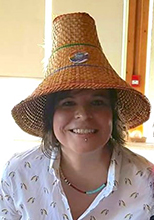
Corrina Sparrow
My communities and I hope to awaken Coast Salish knowledges (teachings, values, stories) about traditional non binary gender and sexuality systems, while exploring contemporary realities, resurgence and visioning for our non binary relatives. This research will lift up non binary Coast Salish experience on the west coast, where they have been previously silenced in literature and community. This work will support development of Coast Salish Two Spirit and non binary community, and services, as a means to contribute to identity-building, healing and traditional governance and gender systems in Coast Salish society.
It is such an honour and privilege to receive this award. The journey of those of us who are non-binary to reclaim space in family, community and culture has been a long one. Recognition and support shown by UVIC and the donors is both validating and affirming, as we embark on this path of cultural reconnection and healing in our Indigenous communities. I am so grateful to have friends and allies at UVIC standing by my side.
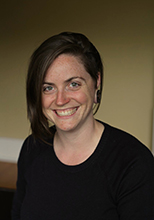
Mattie Walker
My research explores how young people utilize, learn, create, and engage with language regarding gender, particularly diverse experiences of gender including trans identities. A stronger comprehension of how young people utilize language and engage in terminology creation within their social contexts can enable researchers and practitioners within the helping fields to be better equipped to help young people navigate the challenges that they may face. I believe that exploring how young people utilize and create language regarding diverse gender experiences and transgender experiences as self-advocacy and self-empowerment will continue to add to depth of understanding of gender in order to influence policy and practice within the helping fields.
Receiving this award from the Chair in Transgender Studies means a lot to me as it gives me the opportunity to focus on my research and continue to pursue my work with gender diverse young people.
Audrey Wolfe
My research explores how LGBTQ and gender-fluid youth make sense of their experiences with sexualized and intimate partner violence. My inquiry is situated within the West Coast of Canada and the United States during the 1990s when feminist theories about violence and public discourses about queerness were shifting. This (auto)ethnographic research will include analyzing zines and pieces of personal narrative text to access distinct aspects of survival that do not yet exist within the current literature upheld by the academic world.
Receiving this award means the world to me! As a student who relocated for graduate studies and has experienced barriers to employment, I have struggled with paying the high costs of tuition. Without this award, I would not be able to complete my final semester of coursework and begin my journey through autoethnography.
2017 Undergraduate Research Scholar
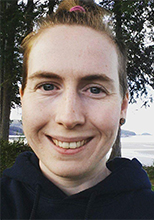
Jennie MacPhee-Woodburn
I am a fourth-year student completing my Bachelor of Social Work in the Faculty of Human and Social Development. I plan to pursue my MSW and a career in clinical social work, specializing in gender identity issues. Beginning in September I will begin a practicum placement at TransCare BC. During my time at TransCare, my work will be focused on issues faced by children, youth and their families. I will be producing a resource for community organizations across the province who facilitate workshops and support groups for parents of trans and gender creative kids. This will include a needs assessment, and the purpose of this resource will be to help organizations to provide more relevant and competent support for this demographic. In addition to this project, I will also be assisting with the production of online training modules for health care providers.
I would like to sincerely thank you for selecting me as a successful candidate for the Chair in Transgender Studies Undergraduate Research Scholarship. I am very grateful and excited for the upcoming work and research I will be doing, and thanks to your generous scholarship, I will be able to do it a bit more easily. As I come to the end of my social work degree, I am again very grateful to you for your generosity and for supporting my education. This scholarship will enable me to maintain focus on my courses and practicum placement, and to contribute to the health and well-being of the transgender community in B.C.
2017 Visiting University-based Fellows
Elias Capello
I am a medical anthropologist who plans on examining materials (pamphlets, original art works, and conference records) in the Transgender Archives to better understand the linguistic patterns of how transgender people disseminate knowledge about their bodies and health in order to eliminate the gap in medical literature. The linguistic patterns of how transgender people communicate about their bodies will be compared with the research papers in the archives, to compare the two knowledge forms. I focus on themes of embodiment, dissemination of knowledge about bodies and health, and resilience.
As an early career Master's student in Anthropology, this award helps me continue my pre-dissertation research as well as make connections with researchers that share similar interests. In addition to helping my research career, research funded by this award will help design the curriculum for an undergraduate level Transgender and Queer Health Course at the University of Massachusetts, Amherst.
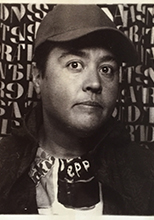
Chris Vargas
I am planning to do research for the third iteration of the multi-exhibition series Trans Hirstory in 99 Objects, which will take place in early 2018 at the Legacy Gallery in downtown Victoria, B.C.. Trans Hirstory in 99 Objects is a visual and material exploration of objects that hold significance in narrating the history of transgender communities. It is an extension of the Museum of Transgender Hirstory & Art, my interdisciplinary conceptual art project.
The Chair in Transgender Studies Research Fellowship will help fund my travel to UVic to do research for an exhibition I am organizing at the Legacy Gallery in downtown Victoria, B.C. This award will allow me to spend time researching the trans history and art objects housed in the UVic Transgender Archive that I will then highlight in the exhibition.
Chamindra Weerawardhana
This award is a key step in developing my ongoing book project on Trans identities and parenting. My book develops a Trans woman-of-colour, and most importantly, 'decolonizing' perspective of parenting. Hence the importance of spending some at the Trans Studies Chair at Victoria, a university which is also home to a world-leading First Nations and Indigenous Governance program. I would also like to acknowledge people whose support has been crucial to this project, my family of course, and ILGA, especially ILGA Director Dr Renato Sabbadini, for the opportunity of carrying out a workshop on TransParenting at the 2016 ILGA World Conference in Bangkok.
I would also like to acknowledge people whose support has been crucial to this project, my family of course, and ILGA, especially ILGA Director Dr Renato Sabbadini, for the opportunity of carrying out a workshop on TransParenting at the 2016 ILGA World Conference in Bangkok.
2017 Community-based Fellows
Alex Bakker
I am honoured to receive a scholarship from the Chair in Transgender Studies. And very excited, because it allows me to research the Transgender Archives for any materials that show how early trans history of the Netherlands was perceived overseas. Who knows what gems I might delve up in the vast archives. Mapping transgender history from all kinds of places in the world is the right thing to do now, I think. The transgender present needs more context from the past.
Ludovic Foster
Receiving the Chair in Transgender Studies, and having access to the University of Victoria's wonderful Transgender Archives, is a real honor.


